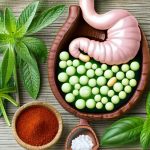The pursuit of optimal health often leads individuals down paths involving dietary supplements—vitamins, minerals, herbal remedies, probiotics, and more. These products are marketed with promises of enhanced wellness, increased energy, and targeted support for various bodily functions. While many experience benefits, a growing number report experiencing uncomfortable or even debilitating gut-related side effects after starting supplement regimens. The gut microbiome, that complex ecosystem within our digestive system, is incredibly sensitive, and introducing external substances can disrupt its delicate balance. Understanding why supplements might cause these issues—and what steps to take—is crucial for anyone considering incorporating them into their health routine.
The human gut isn’t merely a passive receiver of food; it’s an active participant in digestion, immunity, and even mental health. Factors like diet, stress levels, antibiotic use, and now, supplement intake can profoundly influence the composition and function of this microbial community. A healthy gut boasts diversity—a wide range of bacterial species working synergistically. Supplement-induced disruptions can lead to imbalances (dysbiosis), potentially manifesting as bloating, gas, diarrhea, constipation, abdominal pain, or even more serious conditions like irritable bowel syndrome (IBS) flare-ups. It’s important to remember that supplements aren’t a one-size-fits-all solution and individual responses vary greatly. Considering that why even healthy diets can sometimes lead to discomfort, it is no surprise that supplements can as well.
Supplement Types & Gut Impact
Certain supplement categories are more prone to triggering gut side effects than others. For example, high doses of Vitamin C can act as an osmotic agent, drawing water into the intestines and causing diarrhea. Similarly, magnesium supplements—while beneficial for many—often have a laxative effect, especially in forms like magnesium citrate or oxide. Iron supplements are notorious for inducing constipation, nausea, and abdominal discomfort. Even seemingly benign vitamins and minerals can cause issues if the body struggles to absorb them effectively or if they interact negatively with existing gut flora.
Probiotic supplements, ironically, can sometimes worsen gut symptoms in individuals with Small Intestinal Bacterial Overgrowth (SIBO) or histamine intolerance. While probiotics aim to introduce beneficial bacteria, an overabundance of certain strains—or the introduction of strains that aren’t well-tolerated by a particular individual—can exacerbate bloating and gas. Herbal supplements present another layer of complexity; many contain potent compounds that can directly irritate the gut lining or interfere with digestive processes. For instance, licorice root, while traditionally used for soothing digestion, can raise blood pressure and potentially disrupt electrolyte balance in sensitive individuals. Understanding artificial flavors may also be important to consider when looking at herbal supplements.
The formulation of a supplement also plays a role. Fillers, binders, coatings, and artificial ingredients used during manufacturing may not be well-tolerated by everyone’s digestive system. Many supplements also contain excipients designed to aid absorption—these can sometimes contribute to side effects if the body struggles to process them. Choosing products from reputable brands that prioritize purity and minimal additives is a good starting point for mitigating these risks.
Identifying Supplement-Related Gut Issues
Pinpointing whether a supplement is causing gut problems requires careful observation and, ideally, a systematic approach. A key first step is to keep a detailed log of everything you’re taking—supplements, medications, food, and even lifestyle factors like stress levels. Note any coinciding symptoms and the timing relative to supplement intake. This can help reveal patterns and potential culprits.
- Start with Elimination: If you suspect a particular supplement, temporarily discontinue its use and monitor whether your symptoms improve. Never stop essential medication without consulting a healthcare provider.
- Introduce One at a Time: When reintroducing supplements or starting new ones, do so individually and observe for any adverse reactions before adding another. This helps isolate the source of potential problems.
- Consider Dosage: Lowering the dosage of a supplement may alleviate gut issues without completely eliminating it from your routine.
It’s crucial to differentiate between normal adaptation periods and genuine side effects. Some supplements, like probiotics, can initially cause mild bloating or gas as the gut microbiome adjusts. However, these symptoms should subside within a few days. Persistent or worsening symptoms warrant further investigation. Consulting with a healthcare professional – ideally one experienced in functional medicine or gastroenterology – is highly recommended to rule out other underlying conditions and receive personalized guidance. It’s also important to remember that gut sensitivities can sometimes present as something else entirely.
The Role of Gut Permeability & Inflammation
A compromised gut barrier—often referred to as “leaky gut”—can significantly increase the risk of supplement-induced side effects. When the intestinal lining becomes more permeable, larger molecules can pass into the bloodstream, triggering an immune response and inflammation. Certain supplements, particularly those containing high doses of certain vitamins or minerals, may exacerbate this permeability in susceptible individuals. Inflammation then further damages the gut barrier, creating a vicious cycle.
The connection between gut health and overall inflammation is well-established. Chronic inflammation is linked to numerous health problems, including autoimmune diseases, allergies, and mental health disorders. Supplements that promote inflammation—either directly or indirectly—can worsen these conditions. Conversely, supplements aimed at supporting gut healing, like L-glutamine or zinc carnosine, may help restore barrier function and reduce inflammation. In some cases, gut healing can even reverse food sensitivities.
Minimizing Gut Side Effects: Practical Strategies
Proactive steps can minimize the risk of experiencing gut side effects from supplements. First and foremost, prioritize a whole-foods diet rich in fiber, prebiotics (found in foods like garlic, onions, and bananas), and fermented foods to nurture a healthy gut microbiome. This foundational approach strengthens the gut’s resilience and reduces its vulnerability to disruptions.
- Choose High-Quality Supplements: Opt for reputable brands that undergo third-party testing for purity and potency. Look for supplements with minimal additives and fillers.
- Take With Food: Consuming supplements alongside a meal can often buffer their impact on the gut, slowing absorption and reducing irritation.
- Consider Formulations: Different formulations of the same supplement can have varying effects. For example, enteric-coated capsules may protect sensitive compounds from stomach acid and deliver them directly to the intestines, minimizing irritation.
- Stay Hydrated: Drinking plenty of water helps facilitate digestion and prevent constipation, a common side effect of many supplements.
Finally, remember that individual tolerance varies. What works well for one person may not work for another. Pay attention to your body’s signals and adjust your supplement regimen accordingly. If you experience persistent or concerning gut symptoms, seek guidance from a qualified healthcare professional—don’t attempt to self-diagnose or treat the problem without expert advice. You might also consider if chewing gums could be contributing to your digestive discomfort. As well, it’s important to note that cold weather can also trigger gut sensitivity in some individuals. And finally, consider if food intolerances may be playing a role too.


















